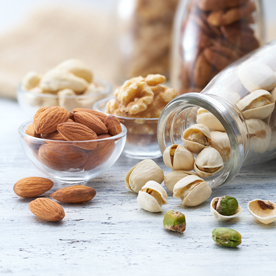
Everyone struggles with low self-esteem from time to time. But it can be more prevalent amongst women with PCOS due to the emotional and psychological implications of the condition (1).
That’s why earning how to improve self-esteem, nurture your sense of self-worth, and speak to yourself with love and kindness is important if you have PCOS.
What does self-esteem mean?
Self-esteem underpins your overall sense of self-worth and personal value – that is to say, how much you love and respect yourself.
 If you have healthy self-esteem, you’re likely to value your achievements and hold yourself in positive regard. If you have low self-esteem, however, you may be overly critical and negative towards yourself, focusing on your presumed ‘shortcomings’ and ‘mistakes’.
If you have healthy self-esteem, you’re likely to value your achievements and hold yourself in positive regard. If you have low self-esteem, however, you may be overly critical and negative towards yourself, focusing on your presumed ‘shortcomings’ and ‘mistakes’.
Low self-esteem symptoms
Signs of low self-esteem may include:
-
Thinking other people are better than you
-
Not accepting compliments
-
Blaming yourself when things go wrong
-
Thinking you don’t deserve to have fun
-
Being critical of yourself
-
Joking about yourself in a negative way
-
Feeling upset by criticism or disapproval
PCOS and self-esteem: What’s the link?
Given the number of difficult physical and emotional changes associated with PCOS, it’s easy to understand the link between the condition and low self-esteem.
Many women may feel a complete loss of control over their bodies and body image. Elevated androgens (‘male’) hormones that characterise PCOS can lead to challenging physical symptoms, including excess hair growth, hair loss, acne, and weight gain, all of which may contribute to low self-esteem.
High androgen levels can also lead to irregular periods and fertility issues, which may further lead to feelings of sadness or insecurity as a woman.
How to build self-esteem
It’s important to remember that PCOS doesn’t and shouldn’t define you. And there are many ways to support your self-esteem and cultivate a deep inner love for yourself despite your diagnosis.
Acknowledge and embrace your attributes
Reminding yourself of your talents and qualities is one of the easiest ways to nurture your self-esteem.
Consider making a list of the attributes you love, like, or simply accept. You may wish to mention any skills you have (‘I’m a good singer and I love that about myself’), personality traits (‘I love that I’m generous with my time and energy’), achievements (‘I love that I can I build healthy, sustainable relationships), or physical characteristics (‘I love my strong, powerful legs that enable me to move’).
If you aren’t ready to use the word “love”, that’s okay. Just replace it with “accept” for the moment.
Practice positive affirmations
When you’re navigating PCOS, advice to ‘be positive’ might come across as patronising. However, little tweaks to your self-talk can be transformational for your mental health.
Try speaking to yourself as you would a best friend – with tenderness, kindness, and compassion – even if it feels awkward and uncomfortable at the start.
Practising simple affirmations can reinforce feelings of self-love and belief. Reciting the following phrases might help. Feel free to jot them down or say them in your head.
-
I believe in myself.
-
I have the inner resources and strength to carry me through this.
-
I acknowledge the many brilliant qualities and talents I have.
-
I let go of the negative feelings and opinions I have about myself.
-
I love and cherish who I’ve become.
-
I love and accept myself.
-
I am beautiful.
You may also wish to create a bank of personalised affirmations that resonate with you to look back at when you’re feeling low.
Step out of your comfort zone
If there’s a new hobby, sport, or activity you’ve always wanted to try, now’s the time to take that leap of faith.
Yes, this can seem scary if you’re struggling with low self-esteem, and yes – it’s easier to find a million and one excuses not to do it – but the simple act of pushing yourself out of your comfort zone – into your stretch zone – will help you feel emboldened.
Be productive
Doing something productive, such as paid work, studying or volunteering can, unknowingly, improve your self-esteem.
Productivity can bring positive value to your life in many ways. It can instil purpose, routine, structure, and an opportunity to socialise with others – the by-product of which may help cultivate a stronger sense of self.
Connect with people who love and respect you
PCOS is a complicated condition. And despite the best intentions of your family and friends, they might not always understand it, which can make it hard to feel validated and seen.
Surrounding yourself with kind, loving, compassionate individuals who recognise your situation and its emotional implications can make you feel held and supported.
It may be useful to seek out a community of other women who have PCOS. Finding a tribe that shares similar experiences can empower you, which may improve your self-esteem.
Set boundaries
Just as it’s important to surround yourself with people who build you up, try to reduce contact with people and situations that negatively impact your self-esteem.
If you notice your self-esteem drops when you’re in certain situations or with certain individuals, you may want to rethink how and with whom you spend your time.
Boundary setting can be hard, especially with people you care about, but it’s vital to look after yourself first.
Self-care
Besides helping you unwind, simple acts of self-love communicate an important message: treating yourself with kindness can make you look upon yourself more kindly.
Try to ringfence 30 minutes each day to do something for yourself. The activity could be creative, such as drawing, active, like yoga, or relaxing – soaking in an Epsom salt bath, for instance.
Listening to music is a great form of self-care. Music has the power to lift your mood, especially when the songs are about feeling confident in your skin. Why not make a playlist of self-esteem songs to turn to when you need a boost?
Get support
For some women, self-care and positive affirmations aren’t enough. If you find that your persistent low self-esteem is disrupting your daily activities and affecting your quality of life, it might be time to seek help.
There’s plenty of support out there. Having a chat with your GP or a therapist who has specific expertise in managing PCOS is a great place to start.
Find out more
Given the challenging nature of PCOS, it’s not surprising so many women experience low self-esteem. If you’re struggling, it’s important to remind yourself that you aren’t alone and that you’re more than your condition.
Fortunately, there are many ways to foster a deep and caring sense of love for yourself. And if self-help strategies aren’t enough, professional support is always a valid and important option.
If you found this look into PCOS and self-esteem useful, you can find similar guidance on our dedicated PCOS health hub. Alternatively, please get in touch with our team of expert Nutrition Advisors, who are on hand to provide free, confidential advice
References:
-
Tay CT, Teede HJ, Hill B, Loxton D, Joham AE. (2019) Increased prevalence of eating disorders, low self-esteem, and psychological distress in women with polycystic ovary syndrome: a community-based cohort study. Fertility and Sterility. 112(2):353-361.
Related Posts?
Disclaimer: The information presented by Nature's Best is for informational purposes only. It is based on scientific studies (human, animal, or in vitro), clinical experience, or traditional usage as cited in each article. The results reported may not necessarily occur in all individuals. Self-treatment is not recommended for life-threatening conditions that require medical treatment under a doctor's care. For many of the conditions discussed, treatment with prescription or over the counter medication is also available. Consult your doctor, practitioner, and/or pharmacist for any health problem and before using any supplements or before making any changes in prescribed medications.

Olivia
Olivia Salter has always been an avid health nut. After graduating from the University of Bristol, she began working for a nutritional consultancy where she discovered her passion for all things wellness-related. There, she executed much of the company’s content marketing strategy and found her niche in health writing, publishing articles in Women’s Health, Mind Body Green, Thrive and Psychologies.
View More



